Automobile is an essential means of transportation that requires regular maintenance, including parts replacement, to remain functional. And just as car dealerships sell vehicles, there are auto parts stores that supply the necessary parts to maintain vehicle upkeep. But when an auto parts store owner tends to go online with their business, they will need an ecommerce platform.
Like the number of automobile garages every neighborhood has, there are plenty of options when it comes to the best ecommerce platform for auto parts. We have researched multiple ecommerce platforms and created a list of the best ones for your easy consideration.
Keep reading to take your auto parts business to new horizons with an ecommerce platform that suits your needs.
What Are Ecommerce Platforms for Auto Parts and Why Do You Need One?
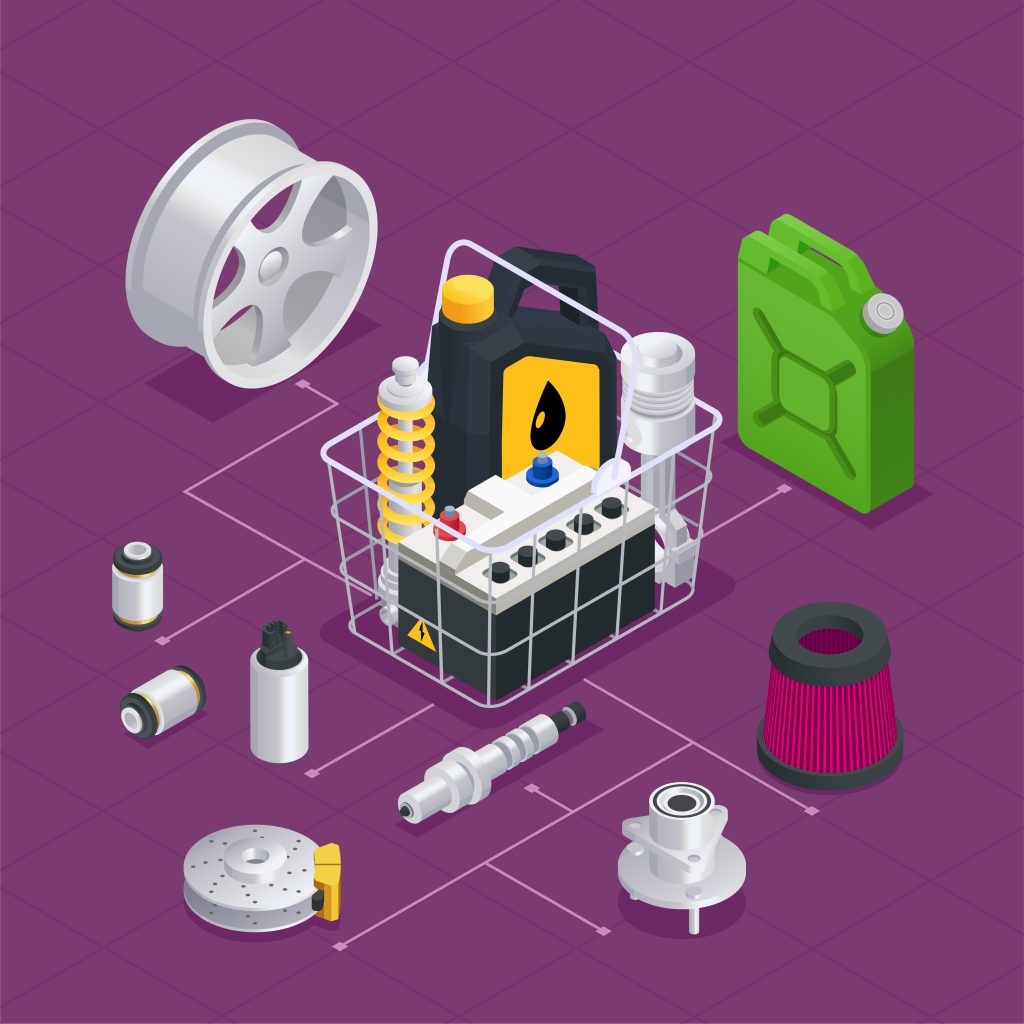
We believe you have a minimum understanding of either auto parts or ecommerce platforms, or as a whole, ‘ecommerce platforms for auto parts’. If not, then let’s break them down in easy words before jumping into the lists.
We’ll keep it simple, first you’ll need a platform to showcase, market, and sell your products. This could be your own ecommerce website or a third-party multi-vendor platform where you compete with others.
Most auto parts store owners prefer their own website because it offers more control and flexibility than third-party platforms. However, setting up an independent online store requires the right ecommerce platform that provides essential features like a shop page, product pages, checkout, payment gateways, etc.
An ecommerce platform brings all these features together in a ready-to-use package.
6 Best Ecommerce Platforms for Auto Parts
Just like the automobile market has different manufacturers, ecommerce platforms also come in many types. They all claim to be the best, but the real-life use often tells a different story.
We have tested some of the top ecommerce platforms. Below we’ll show you the best ones for selling auto parts.
1. EasyCommerce
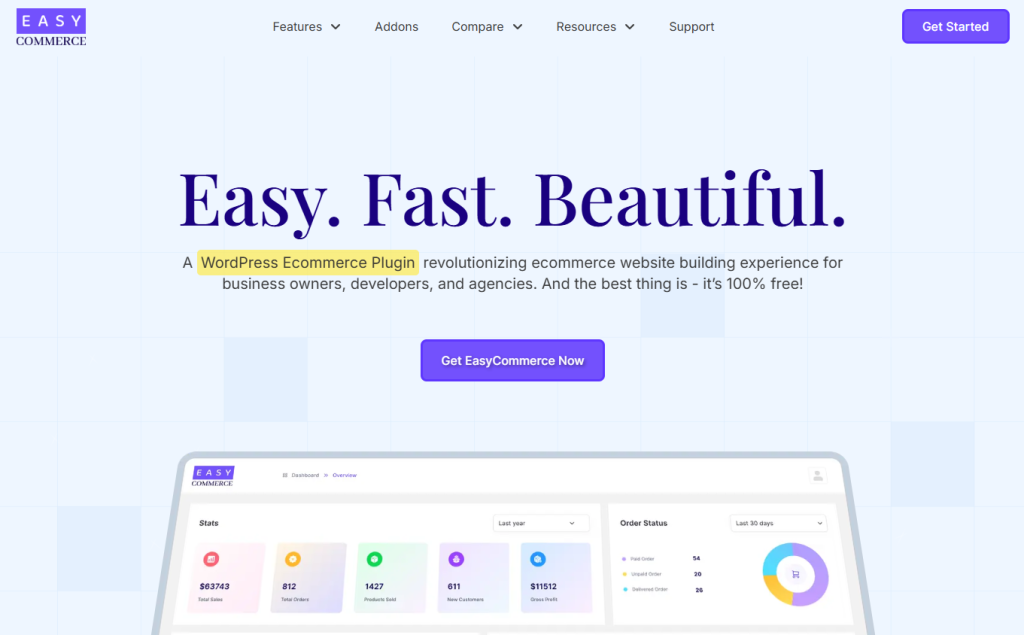
The first ecommerce platform on our list for selling auto parts is EasyCommerce. It’s a WordPress-based solution that’s free to install and use. Unlike the traditional WordPress dashboard, it offers a modern, user-friendly design. This makes managing your website easier and more convenient.
It works well with popular WordPress addons and themes. So, if you already use WordPress, you won’t face any compatibility issues. Moreover, addons like WooCommerce Migration and CSV Importer make it easier for those looking for a switch from their current setup.
One key advantage of EasyCommerce is its speed. It uses a unique data storage method and an API-first approach, with separate data tables for faster processing and retrieval. This makes it the Bugatti of ecommerce platforms.
Want to give it a ride? Click on the download button below.
What We Liked About EasyCommerce
- Auto-generate pricing to make all the product pricing variations possible in a single tap.
- API key-based integration ensures a secure connection while improving data synchronization.
- Easily create coupons to run discount campaigns and keep sales growing.
- Flexible taxation and shipping class creation and implementation.
What We Disliked About EasyCommerce
- Requires more addon for integrating more advanced and capable third-party applications.
Pricing
The core plugin is free to install and use. Most of the addons come free as well.
2. BigCommerce Essentials
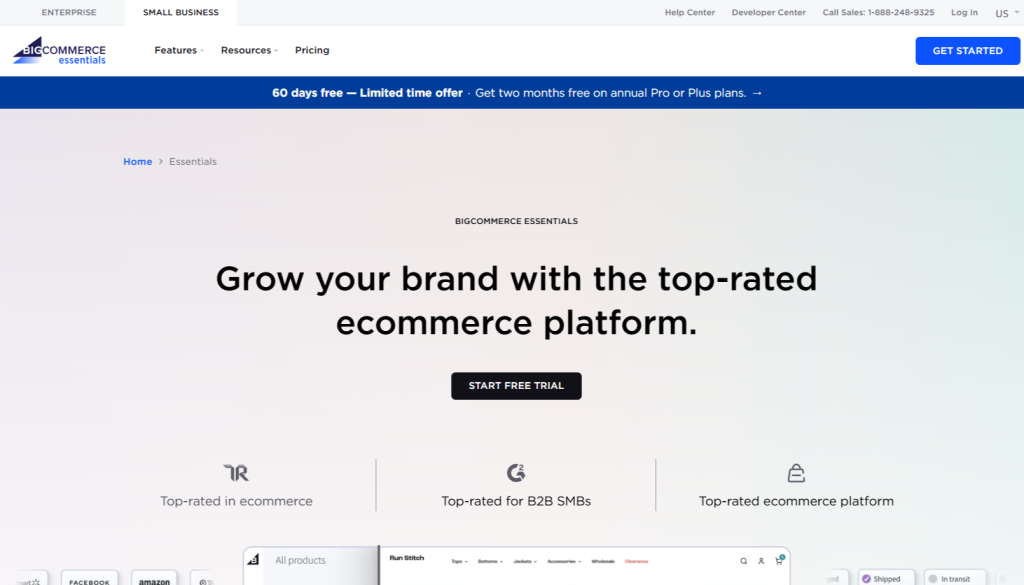
BigCommerce is another WordPress-based solution with powerful ecommerce features. It offers two versions: BigCommerce Essentials for small businesses and BigCommerce for large enterprises. It includes a drag-and-drop builder for easy customization and mobile-responsive themes to help you grow from day one.
BigCommerce Pro plans include built-in hosting, which saves users from the hassle of managing it by themselves.
What We Liked About BigCommerce
- Incorporates a one-page checkout (via third-party apps) for enhanced convenience for the shoppers.
- Built-in hosting service has an unmatched uptime record, even in Cyber Week.
- Sell directly on Facebook, Instagram, TikTok, etc., platforms without extra integrations.
What We Disliked About BigCommerce
- Tier-based sales amount cap limits the user’s store capacity.
- Lacks some native integrations for CRM, marketing automation, and accounting.
Pricing
Paid. Pricing plans include –
- Standard-$29/month
- Plus-$79/month
- Pro-$299/month
3. Shopify

When it comes to selling products online, the name Shopify is usually the first result that comes up in users’ searches or suggestions. It is the most used ecommerce platform (24% of the ecommerce websites on the Internet) after WordPress-based solutions.
It is a paid platform with a built-in hosting feature. Unlike BigCommerce, Shopify doesn’t limit the number of products you can sell within a specific time.
Shopify offers marketing-friendly features like discounts, gift cards, email marketing, content marketing, and SEO optimization. This makes it a top choice for those focused on marketing.
What We Liked About Shopify
- Built-in barcode label generator helps you in precise inventory management.
- Supports a wide range of payment gateways and methods.
- Options to connect shipping platforms like DHL, FedEx, etc., for efficient shipping.
What We Disliked About Shopify
- No Year-Make-Model (YMM) search for customers to find parts compatible with their vehicles.
- Shopify charges transaction fees unless you use Shopify Payments.
Pricing
Shopify is a paid platform with pricing plans. The most popular basic plan starts at $25 per month.
See other pricing plans here.
4. Ecwid
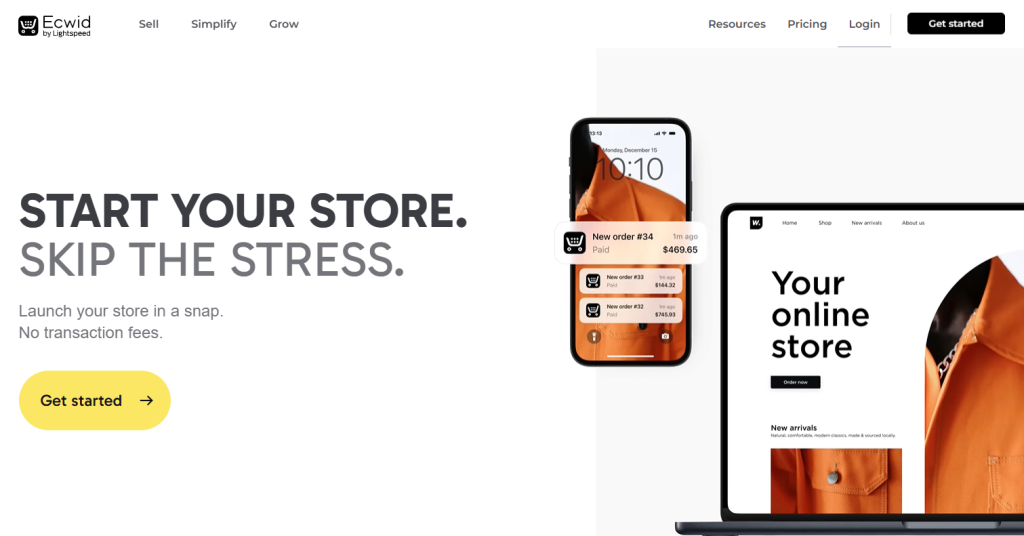
Ecwid by Lightspeed is a cloud-based ecommerce solution designed for small to medium businesses. It follows the same business model like the BigCommerce and Shopify: you subscribe to a plan with default hosting. However, it has a free plan with limited product listings (5 products only).
It includes essential ecommerce features as well as deeper customization using custom coding and Node.js.
What We Liked About Ecwid
- WordPress compatibility makes it easier for users to manage their website directly from the WordPress dashboard.
- Mobile app to help owners manage their ecommerce store on the go.
- Supports 100+ Payment Gateways covering 175+ countries, including Stripe, PayPal, Square, and more.
What We Disliked About Ecwid
- Not suitable for customers with thousands of auto parts listed.
- There are limited customization options when using a website builder.
Pricing
Free plan with limited functionality. Paid plans consist of Venture ($25/month), Business ($45/month and Unlimited ($105).
5. WooCommerce
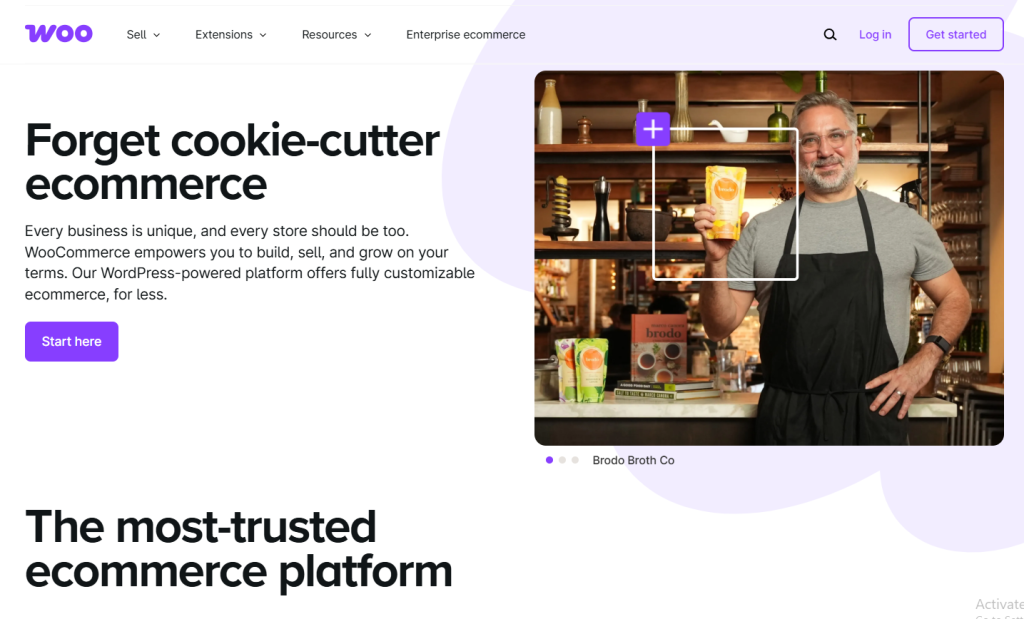
There’s no denying the fact that WooCommerce is the most popular and used ecommerce platform the online industry has ever produced. As of today, it has over 8+ million active users. WooCommerce is a free, open-source platform with thousands of supporting add-ons and plugins built centering it.
WooCommerce comes with the basic WordPress interface and somewhat complicated product listing steps. The best part of using WooCommerce is its high customizability. With a worldwide user base, it’s a top choice for those looking for a supportive community.
What We Liked About WooCommerce
- Easy installation and Setup help new users to start using it right away.
- Suitable for small to medium-sized class businesses, including auto parts stores.
- Lots of third-party integration opportunity results in higher integration opportunities.
What We Disliked About WooCommerce
- The data processing structure makes the store slower as the product lists grow.
- The interface needs a rework, and it lacks detailed reports with graphs.
Pricing
Free to install and use with free and paid extensions.
6. X-Cart
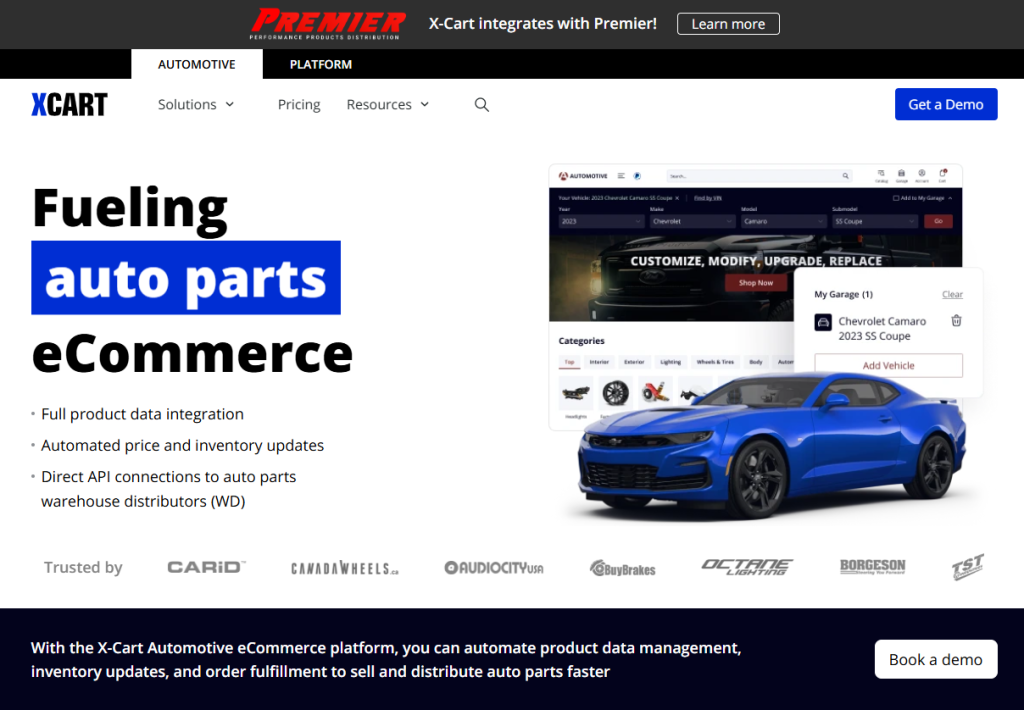
X-Cart is a flexible ecommerce platform with dual hosting options. Unlike the other ecommerce platforms mentioned above, X-Cart is an automotive-specific platform. This gives users an added advantage while creating and maintaining an auto parts online store.
It was established in 2001, and since then, it has equipped 40 thousand + auto parts stores all over the globe. Known for its easy customization opportunity using PHP, it is a customer-centric platform, especially when you’re in the auto parts business.
What We Liked About X-Cart
- Full customization control over design and functionality.
- Scalable for businesses of all sizes with support for large product catalogs.
- Offers both self-hosted and cloud-hosted options for flexible deployment.
What We Disliked About X-Cart
- The self-hosted version requires technical expertise for setup and maintenance.
- Fewer pre-built themes compared to other platforms.
Pricing
Free and Paid. The open-source ‘Platform’ model is free to download and use. But it lacks automotive-specific capability, which can be filled with a pro plan for $499 a month.
Best Ecommerce Platform for Auto Parts: Checklist
Still not sure which ecommerce platform is best for your auto parts business? Well, here are major angles that you can try judging an ecommerce platform with and find your convenient one easily.
Read more on B2C Ecommerce best practices in another one of our blogs here.
Let’s go through some of those criteria –
1. User Interface and Experience

Your ecommerce platform’s interface plays a big role in your overall store experience. A dull or cluttered layout can feel boring and confusing. Since you will spend hours using it, the interface should be simple, easy to navigate, and enjoyable to use.
The same goes for your customers when they browse your ecommerce website. Your shop, product, and checkout pages should look good and work smoothly. This attracts visitors and keeps them coming back to buy again.
2. Product Management
Managing products is one of the most tedious tasks for an ecommerce store owner. With hundreds of products and new ones constantly being added, it’s important to choose a platform that makes listing-updating products, and inventory management easy.
Otherwise, you’ll waste valuable time that could be spent on other tasks.
3. Customer Management
Customer operations in an ecommerce website have two sides. First, customers need a dashboard to sign in and view their order summary at a glance. Second, as a store owner, you need tools to manage customer lists, track orders, and run marketing campaigns.
An ideal ecommerce platform should offer seamless functionality and convenience for both customers and store owners.
4. Order and Fulfilment
The purpose of your auto parts ecommerce store is to receive and fulfill customer orders on time and as promised. Your ecommerce platform should have the necessary features to help you manage orders efficiently.
This includes tagging orders with statuses like processing, on hold, shipped, delivered, or rejected, so both you and your customers can track their progress.
5. Checkout
Checkout is a tricky part of an ecommerce purchase. If the checkout experience isn’t satisfying to the customer, there’s little chance that they will make the purchase. Most users don’t like to create an account to make a purchase.
They also expect to pay using their convenient payment method. That’s why avail an ecommerce platform that offers guest checkout, has popular payment gateways, and lastly error-free order placement.
6. Payment and Other Integrations

As mentioned earlier, an ideal ecommerce platform for auto parts should let customers pay using their preferred method. To do this, your store needs to connect with a payment gateway. Make sure the platform supports this through an add-on or integration tool.
Also, check if it offers other essential integrations like CRM, marketing automation, and analytics.
7. Built-in Reporting
Reporting is very important for not just the auto parts business but every ecommerce business. A proper reporting helps you understand the business metrics thoroughly, calculate current ongoing and upcoming challenges.
Ecommerce having such reporting features makes things easier for you to take data-driven strategies.
8. Data Security and Support
Remember that your buyers are trusting you with their data related to their financial accounts, personal credentials like name, contact information, address, etc. Make sure the ecommerce platform in question has active protection for data security for both the user and your data.
Additionally, it should offer active support for any issue or question that arises at the time being.
Conclusion
More and more car owners are loving the idea of maintaining their cars at home, with auto parts delivered directly to their garage. This trend has made ecommerce websites for auto parts the perfect solution to meet their growing needs.
So if you’re keen to join in auto parts ecommerce business, you will require just a website equipped with an ecommerce platform. Choosing the best platform means focusing on key aspects like ease of use, straightforward operation, scalability, and low maintenance costs.
We suggest you use EasyCommerce if you want all these at once. However, the other platforms mentioned come with their benefits as well.

